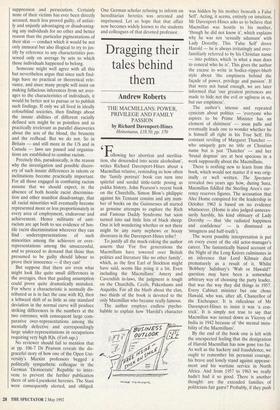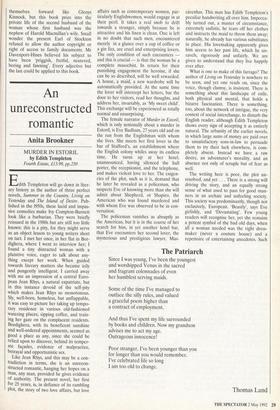Dragging their tales behind them
Andrew Roberts
THE MACMILLANS: POWER, PRIVILEGE AND FAMILY PASSION by Richard Davenport-Hines Heinemann, f18.50, pp. 370 Flowing her abortion and sterilisa- tion, she descended into acute alcoholism', writes Richard Davenport-Hines about a Macmillan relative, reminding us how often the 'family portrait' book can turn into spiteful and sordid tittle-tattle posing as pukka history. John Pearson's recent book on the Churchills, Simon Blow's philippic against his Tennant cousins and any num- ber of books on the Guinnesses all started as genuine attempts to explore the Rich and Famous Daddy Syndrome but soon turned into sad little lists of black sheep. One is left wondering whether or not there might be any nutty nephews or boozy divorcees in the Davenport-Hines tribe?
To justify all the muck-raking the author asserts that 'For five generations the Macmillans have towered over British politics and literature like no other family', which, as the first Earl of Stockton might have said, seems like --aging it a bit. Even including the Macmillans' Amery and Cavendish in-laws, the judgment is tough on the Churchills, Cecils, Pakenhams and Asquiths. For all the blurb about the clan, two thirds of the book is devoted to the only Macmillan who became really famous.
The author employs endless psycho- babble to explain how 'Harold's character
was hidden by his mother beneath a False Self. Acting, it seems, entirely on intuition, Mr Davenport-Hines asks us to believe that Macmillan was hostile to his mother, `though he did not know it', which explains why he was not 'sexually adamant' with Lady Dorothy. This 'False Self drove Harold — he is always irritatingly and over- familiarly referred to by his Christian name — into politics, which 'is what a man does to conceal who he is'. This gives the author the excuse to write in bodice-ripper-blurb style about 'the emptiness behind the façade of power, privilege and passion'. If that were not banal enough, we are later informed that 'our greatest pretences are made to hide not the evil or ugliness in us, but our emptiness'.
The author's intense and repeated cynicism about politics — 'everyone who aspires to be Prime Minister has an element of shittiness' -- soon palls and eventually leads one to wonder whether he is himself all right in his True Self. His constant reviling of Margaret Thatcher who uniquely gets no title or Christian name but is just 'Thatcher' — and her `brutal dogmas' are at best specious in a work supposedly about the Macmillans.
There is nothing new to learn from this book, which would not matter if it was orig- inally or well written. The Spectator revealed two years ago how, during Suez, Macmillan fiddled the Sterling Area's cur- rency reserves figures. The accusation that Alec Home conspired for the leadership in October 1963 is based on no evidence whatsoever. (Home is also judged unneces- sarily harshly, his kind obituary of Lady Dorothy — that 'she radiated happiness and confidence' — is dismissed as `smugness and half-truth').
The worst possible interpretation is put on every event of the old actor-manager's career. The fantastically biased account of the Night of the Long Kniyes culminates in an inference that Lord Kilmuir died prematurely as a result of it. Whilst `Bobbety' Salisbury's Wab or Hawald?' question may have been a somewhat arbitrary way of choosing the party leader, that was the way they did things in 1957. Every Cabinet minister but one chose Hawald, who was, after all, Chancellor of the Exchequer. It is ridiculous of Mr Davenport-Hines to insist it was 'a con- trick'. It is simply not true to say that Macmillan was turned down as Viceroy of India in 1942 because of 'the mental insta- bility of the Macmillans'.
By the end of the book one is left with the unexpected feeling that the denigration of Harold Macmillan has now gone too far.
As well as the hackery and fraudulence, we ought to remember his personai courage, his brave and lonely stand against appease- ment and his wartime service in North Africa. And from 1957 to 1963 we really hadn't had it so good. There is another thought: are the extended families of politicians fair game? Probably, if they push themselves forward like Glenys Kinnock, but this book pries into the private life of the second husband of the woman whose first husband was the nephew of Harold Macmillan's wife. Small wonder the present Earl of Stockton refused to allow the author copyright or right of access to family documents. Mr Davenport-Hines believed his subject to have been 'priggish, fretful, neutered, boring and fawning'. Every adjective but the last could be applied to this book.



















































 Previous page
Previous page